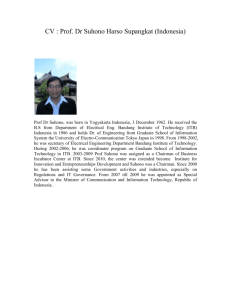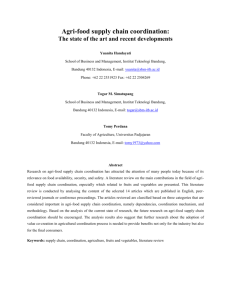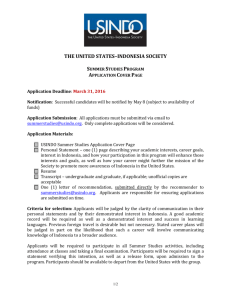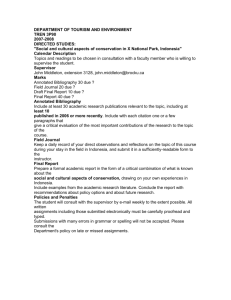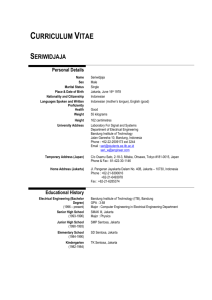Marco Polo Report
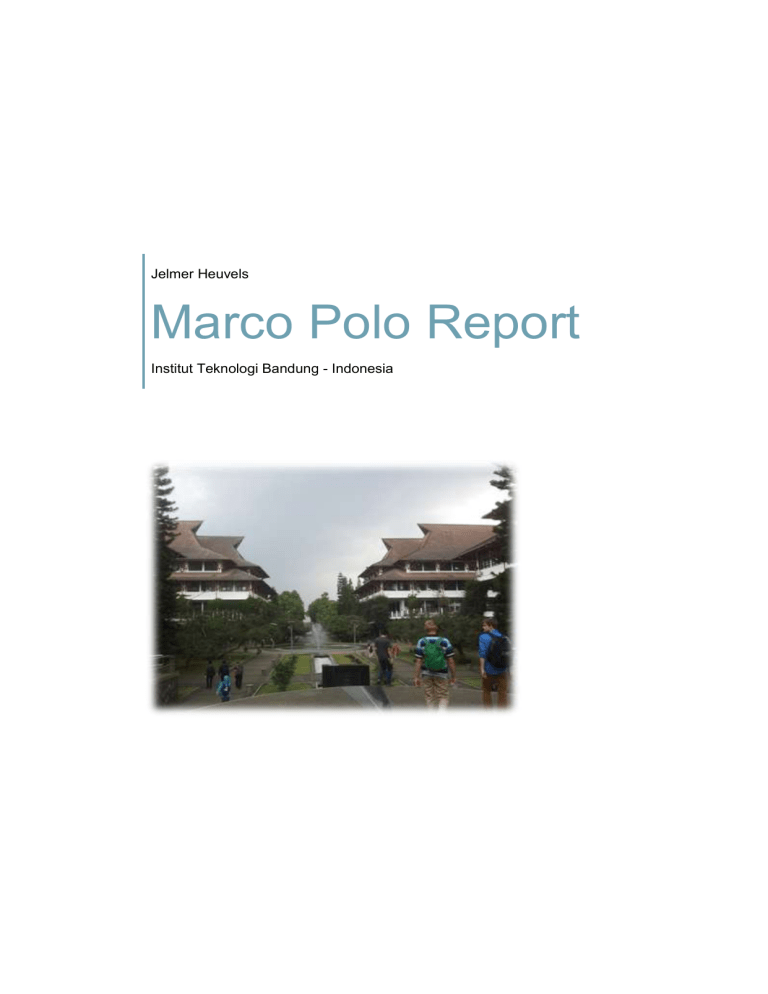
Jelmer Heuvels
Marco Polo Report
Institut Teknologi Bandung - Indonesia
General report
1. Host institution and exact dates of semester abroad
I studied at Institut Teknologi Bandung (ITB) in Indonesia. I followed courses at the only non-technical faculty at ITB, the School of Business and Management. The first semester of 2014-2015 started with an introduction day for bachelor students on August 14 th and it ended on December 4 th .
2. Contact with home faculty, preparation and journey
I went to a Marco Polo workshop in which all the right information was provided. The RUG gave my email address to the exchange officer of ITB and she sent me the right documents. I was accepted by ITB after I sent my application. To arrange my socio-cultural visa I had to visit the embassy in The Hague twice. I would like to advise students to arrange a visa on arrival instead of a socio-cultural visa if you are planning to go outside
Indonesia in the first three months. I will come back on that later. Besides, do not put a lot of afford in your
Learning Agreement. Once you are at ITB, a lot of courses are not available anymore or only for Indonesians. I flew to Bandung with my 4 fellow buddies from Groningen on the 13 th of August. We had a direct flight with
KLM to Jakarta with a stop in Kuala Lumpur. The exchange officer of ITB arranged a convenient minivan for us from the airport straight to our Rooftop Residence.
3. Residence abroad
Arrangements
Our exchange officer, Anti, advised us to apply for a socio-cultural visit visa and supplied us with the necessary documents to obtain this at the embassy in the Netherlands. This visa is valid for 60 days, after that it has to be extended every month. This can be done by ITB. However, I went to Singapore within these three months and when I got back to Indonesia I had to buy a Visa on Arrival. Hence I had to extent my visa on arrival by myself after a month and after 2 month I had to leave to country. My advice to people who’d like to travel outside Indonesia within the first three months is to apply for a visa on arrival in when you arrive in
Indonesia. This will save you money and time for going to The Hague twice. If you have any questions regarding this, do not hesitate to contact me.
The health check
I went three times to Meditel in Groningen to get the right vaccinations (tetanus, hepatitis A & B). Before departure, I called with my health insurance to check about my insurance in Indonesia.
Arrival and departure dates
I arrived in Indonesia August 13 th and I flew back to the Netherlands January 13 th and arrived January 14 th at
6.00 in the morning. The flight took around 16.5 hours.
Accommodation
All foreign students from the University of Groningen stayed together in student apartments, where everyone had their own room with desk, closet, bed, and toilet/shower. It was located at Jalan (street) Tubagus
Ismail and it is called Rooftop Residence. The rent is 1.7 million Rupiah each month but it is cheap compared to the Netherlands and it is the coziest place to live with Indonesians and international students.
Reception and introduction
We arrived one day before the introduction days, consisting of presentations, a campus tour and all the necessary information. It is a good way to get to know other international students.
Student life, culture and leisure
I had only class on Tuesday, Wednesday and Thursday, but some courses gave a lot of assignments and homework, so during the week I was busy finishing those assignments. However, the assignments are not hard but the reports you have to make are big. I met a lot of locals in Rooftop Residence who became friends eventually. Personally I learned a lot from the Indonesian culture. Thinks like being patient and being able to
1
handle different ways of communication are really important in Indonesia. I also made a lot of weekend trips with fellow international students from Germany, France etc. At first sight Indonesians look really shy, but they are always willing to help a ‘bule’, which means a white foreigner.
Language
The international office offered a weekly Bahasa Indonesia course on Friday, but I failed to attend it on a weekly basis due to weekend trips. Generally, local people do not speak English. However, the course helped me picking up new words so that I could get around in Bandung pretty soon.
4. Grant
Adequacy of the grant
The University of Groningen provided me the right information on how to apply for the Marco Polo scholarship and the amount of money I could expect. It is around €800 and €900. Basically this is just enough to cover your flight ticket to Indonesia. However, life in Indonesia is cheap and with an extra €100 euro for not using the public transport in Holland (in Dutch ‘ov-vergoeding’) I could get around easily.
Expenses
Renting a room in Rooftop Residence will cost you around 1.7 million Rupiah. As mentioned before the cost of living is cheap. A diner on the street will cost you around 12.000 rupiah which is less than €1. The GGD advises people to not eat on the street. However, in my opinion the street food is tastier and better prepared than the food in the fancy restaurants. This is because all the locals eat street food and hence the turnover time of the food is faster. International students got sick of restaurant food more often than because of street food. Although live is cheap, a lot of students do some travelling and it is advisable to save up some money for that.
5. Study
Introduction
To be honest, studying in Bandung was way easier than in Groningen. I had three days of college but it was never really hard. However, we had to do assignments and projects a lot. Sometimes they had a minimum requirement of 20 pages. Again, the courses are not hard but it can be a lot of work. Previous years people could do the master courses so international students were finished at the 20 th of August. However, we could only do one master course. After some discussion we managed to follow two master courses instead. In the end, I did two master courses and three bachelor courses.
Dates
The bachelor courses started the 18 th of August and ended the 4 th of December. The master courses started one week later, August 25 and exams were at the middle of November. The examination period consisted of two written exams and three final take home assignments.
Remarks
In general there is less structure in Indonesia and therefore a lot of chaos. The first week was kind of frustrating since we had to change our whole course package. Also the communication about the courses should be handled more carefully. It is a good thing that students can pick their courses in the first week, but there was confusion about how many master courses we were allowed to follow. In the end, I planned all courses in three days so I had time left for traveling and to experience the beautiful country Indonesia is.
Study facilities/ International Office abroad
The facilities at ITB are sufficient but the only thing that does not work properly is the internet. We also experienced it at the Rooftop Residence. The internet is working, but is not as fast as we are used to. The
International Office was really helpful and kind. Questions we had were carefully handled.
2
Summary of subjects taken
My learning agreement consisted of three bachelor courses and two master courses.
Bachelor courses:
Organizational Development and Learning Organizations (4.5 ECTS)
Creativity and Innovation (4.5 ECTS)
Shopping Behavior (4.5 ECTS)
Master courses:
Marketing Management (9 ECTS)
Operations Management (9 ECTS)
6. Other relevant info you
First of all I would like to recommend learning a little Bahasa Indonesia before you depart to Indonesia. It is a good way to show your good will and respect to local Indonesians. Second, I would highly recommend you to pick courses with regard to the days you want to spend at school. Although it might be exhausting to have a long day at school, the 4 day weekend will be more than welcome when you would like to explore Indonesia. As mentioned before, take time to figure out which visa is appropriate for you, visa on arrival or socio cultural visa.
7. Summary impression
Studying in Bandung has been the best experience of my life. Overall, I think Indonesia is an awesome place for studying. The cost of living is low and the travel opportunities are great. Although the quality of the education is lower than in the Netherlands, ITB is one of the best universities and highly respected in Indonesia.
You learn to communicate with foreign people with different cultures. Since Indonesia is a cheap country, it is likely you will save some money for travelling. I think most students want to meet new people, learn about different cultures and travel a lot in Indonesia.
3
Specific report
The bachelor courses started the 18 th of August and ended the 4 th of December. The master courses started one week later, August 25 and exams were at the middle of November.
Bachelor courses:
1.
Organizational Development and Learning Organizations (4.5 ECTS)
2.
Creativity and Innovation (4.5 ECTS)
3.
Shopping Behavior (4.5 ECTS)
Master courses:
4.
Marketing Management (9 ECTS)
5.
Operations Management (9 ECTS)
1. ODLO
Host institution and study period
Institut Teknologi Bandung, Indonesia, first semester, 2014-2015
Lectures and literature
Tuesday 9.00-11.30
1. Cummings, Thomas G., Worley, Christoper G., (2009), “Organizational Development and Change”,
South-WesternCengage Learning. (TGC)
2. Tjakraatmadja, JannH., Lantu, Donald C. (2006), “Knowledge Management in the Context of Learning
Organization”, SBM ITB.
Overview of lecture program
Mostly two hours of listening to a lecture given by two teachers. The last half hour we had to work on little assignments.
The grading policy is stated below:
Mid-term Examination (Written): 25%
Final-term Examination (Written): 25%
Project Presentation: 20%
Team Project Assignment: 15%
Individual Contribution: 15%
Contents
People always work in groups (institutions/organizations) in order to realize a common goal. Organizations live in an environment which is dynamic in nature and all the different stakeholders have their own interest.
Because of the different interests, the meaning of organizational success/effectiveness should be put in balance and always changing all the time. This course module was designed with the perspectives that students who take this course will gain knowledge and expertise to diagnose, analyze and recommend solutions to organizational problems behaviorally. Moreover, students will have knowledge about how to keep organization effective all the time.
Lecture-related activities
We had one guest lecture about airplane technology in Indonesia. Furthermore, we did case analyses, a written mid-term and final-term and a final project.
Relevance to Groningen study program
Organizational development and learning organizations are subjects that fit well in a business focused study program.
4
Study load
Besides the mandatory lectures, preparations were never more than reading a case or finish a small assignment.
Assessment in Groningen
The course equaled 4.5 ECTS.
5
2. Creativity and Innovation
Host institution and study period
Institut Teknologi Bandung, Indonesia, first semester, 2014-2015
Lectures and literature
Thursday 8.00-10.30
• Management and Creativity: From Creative Industries to Creative Management, Chris Bilton, Paperback –
September 1, 2006
• The Rise of the Creative Class: And How It's Transforming Work, Leisure, Community, and Everyday Life,
Richard Florida, Second Edition edition (June 26, 2012)
Overview of lecture program
We started every week with a 30 minute lecture. The remaining two hours we had to work on creative projects and ideas.
The grading policy is stated below:
Aspect %
10
10
Description
Mid-Semester Exam
Final Exam
Individual Performance 45
Group Performance
Peer
35
20
10
7,5
7,5
20
5
10
12
Blog
Attendance
Participation blog
Presentation
Content
Presentation Delivery
Final
Contents
This course combines lecture and exercise to develop skills and to obtain hands-on experience. In this course, students are expected to balance the use of both right and left sides of the brain. This course will let you analyze daily problems in Bandung and you have to come up with creative solutions.
Lecture-related activities
Students will receive lectures, from the lecturer and from experts from creative and innovation industries.
We joint a fieldtrip to a shoe factory, a jeans factory and the ‘Silicon Valley’ of Indonesia. This course also provides games and exercises that will enhance the experience in creative thinking.
Relevance to Groningen study program
Creativity and Innovation makes a good add-on to Management and Product Innovation in Groningen. With the same theories it is more focused on smaller businesses. I chose the course because there is no similar course at the RUG and it sounded interesting. You learn how to tackle problems from another perspective and you can apply insights in smaller start-up companies too.
Study load
Besides the mandatory lectures, preparations were never more than reading a case or finish a small assignment.
Assessment in Groningen
The course equaled 4.5 ECTS.
6
3. Shopper Behavior
Host institution and study period
Institut Teknologi Bandung, Indonesia, first semester, 2014-2015
Lectures and literature
Tuesday 13.00-15.30
No mandatory textbook, we had to read articles and case studies.
Overview of lecture program
Mostly two hours of listening to a lecture given by two teachers. The last half hour we had to work on little assignments.
Contents
This course gave us the opportunity to put some marketing theories into practice. In Groningen we mostly learn the theoretical part. In Bandung we had the opportunity to do our own small research about shopping behavior. Shopping behavior is a small area in marketing.
Lecture-related activities
Since this course was only available for international students the amount of people that attended was low.
We also went on a fieldtrip.
Relevance to Groningen study program
Shoppers Behavior is strongly linked to marketing management. As well as in Bandung as in Groningen I have had Marketing Management.
Study load
Besides the mandatory lectures there were almost no preparations. We had to do three assignments of approximately seven hours that determined our final grade.
Assessment in Groningen
The course equaled 4.5 ECTS.
7
4. Marketing Management
Host institution and study period
Institut Teknologi Bandung, Indonesia, first semester, 2014-2015
Lectures and literature
Wednesday 13.00-19.00
Besides scientific articles and case studies we used Principles of Marketing, 15 thedition (2014), by Philip
Kotler and Gary Amstrong (KA).
Overview of lecture program
The first two hours our teacher explained new theories. Subsequently, we analyzed our 2 case studies for that week.
Quiz 20%
Class participation 25%
Group’s Final Project 30%
Individual Final Test 25%
Contents
The goal of this course is to provide a fundamental understanding of marketing management processes as a part of a company’s efforts to create value for its customers. The learning goals of this program is to develop knowledge, skills, and sensitivity in business administration that are required to manage marketing processes needed for developing a company’s strategic planning.
Lecture-related activities
We had to make two case studies every week which took a lot of time. Therefore the master courses were more intensive than the bachelor courses.
Relevance to Groningen study program
Indonesians focus more on the practical part, while courses in the Netherlands focus more on theory. In
Groningen we gain knowledge by studying books and now I had to apply this knowledge into practical situations. I had to read the same book as I did at the RUG, but we studied the theory with cases and practical questions.
Study load
Each class took 5 hours of lectures per week. Besides this, we needed time to write a report, make assignments, study for exams and etc. The study load was less than I was used in the Netherlands. However,
Indonesian teachers explain all the theory in the books and therefore we did not read the books.
Assessment in Groningen
The course equaled 9 ECTS.
8
5. Operations Management
Host institution and study period
Institut Teknologi Bandung, Indonesia, first semester, 2014-2015
Lectures and literature
Thursday 13.00-19.00
Besides scientific articles and case studies we used Jacobs, F.R. and Chase, R.B. (2011). Operations and
Supply Chain Management, 13th ed. Global Edition, McGraw-Hill.
Overview of lecture program
We started each lecture with an explanation of the textbook. After this we started a discussion for one hour.
We had to make an assignment every week.
The grading policy is stated below:
Quiz 10%
Individual Class Participation 10%
Case analysis 20%
Mid Test 25%
Final Test 35%
Contents
Operations management focuses on carefully managing the processes to produce and distribute products and services. Even when people don’t name their activities as part of operations management, as small businesses do so, but actually they carry out the activities related much to the term “operations management”. All activities from managing purchases, quality control, storage, inventory control, production, and distribution are covered by operations management. Not only at operational level, it does talks about strategic issues such as selecting location and capacity planning and tactical issues that address how to efficiently schedule material and labor within the constraints made in strategic level. The main goal of operations management is delivering a firm’s goods and services in the most effective manner. A great deal of focus is on efficiency and effectiveness of processes.
Lecture-related activities
We had two lectures, but we did not go on a fieldtrip. The final term was not a written exam but a final project at a company we could choose ourselves.
Relevance to Groningen study program
In Groningen there are related courses like ‘Supply Chain Management’ and ‘Operations Management’.
Study load
The lecture did not take 5 hours every week. Most of the lectures we were finished in 4 hours. However, we had to make a small assignment every week that cost us 4 hours on average.
Assessment in Groningen
The course equaled 9 ECTS.
9
